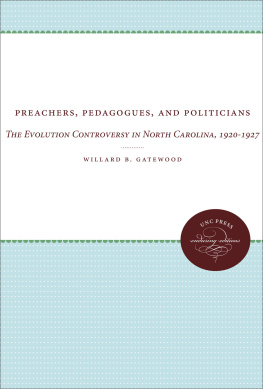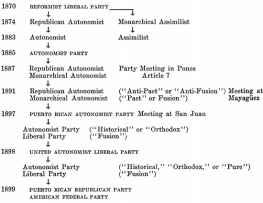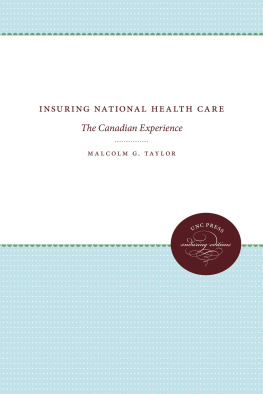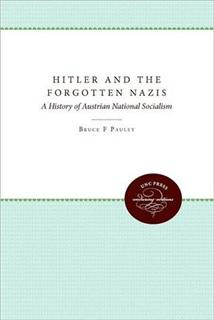Preachers, Pedagogues, and Politicians
Copyright 1966 by
The University of North Carolina Press
Copyright 1965 by The Southern Historical Association
Manufactured in the United States of America
Library of Congress Catalog Card Number 66-15504
Printed by Kingsport Press, Inc., Kingsport, Tennessee
To my daughter
Preface
A generation accustomed to missiles and moonshots is likely to consign the evolution controversy of the 1920s to the realm of flagpole sitting, the Cou craze, and other comic mementoes of the decade. But behind the more ludicrous aspects of the conflict lay the deep-seated fears, anxieties, and frustrations of a people who had come to feel alienated from their past. During those first few years following World War I a series of tremors ran through American society as a half century of social, economic, and intellectual changes, as well as a host of new forces unleashed by the war, presented themselves as realities that could no longer be ignored. Traditional formulas for the good life seemed strangely inappropriate in the new America in which old certainties, one after the other, buckled before a rash of social and cultural innovations. The prospects of this new environment set off a spasm of popular disorientation of which the agitation over evolution was one significant manifestation.
This study attempts to contribute to the existing literature on the evolution controversy by exploring the subject in some detail at the grass roots level. For several reasons North Carolina offers an especially appropriate field for such concentration. The controversy raged there throughout most of the 1920s, and perhaps in no other state was the role of the educational leadership more decisive. More significant, the national anti-evolutionist leaders themselves considered the state one of the most critical arenas of their campaign. Failure to enact a statewide statute in North Carolina undoubtedly had an adverse effect upon their crusade in other states. But this work deals primarily with the conflict over evolution in one state within a specified period of time. It includes neither extensive discussions of the origins of regional traditions, which well may be pertinent, nor lengthy speculations about the possible relationship of Puritanism, Jeffersonian philosophy, and the anti-slavery question to the evolution controversy in the South during the twentieth century.
Several institutions and many individuals provided valuable assistance in the preparation of this volume. I am particularly indebted to the American Association for State and Local History and the American Philosophical Society for research grants and to the Social Science Research Institute of the University of Georgia for the proficient typing services of Mrs. Joanna Parsons and Mrs. Sandra Daniels. My research was greatly facilitated by the cordial co-operation of librarians and archivists at The University of North Carolina at Chapel Hill, Wake Forest College, Duke University, North Carolina State University at Raleigh, Atlantic Christian College, the North Carolina Department of Archives and History, and the Presbyterian and Reformed Historical Center at Montreat, North Carolina. To Walter and Susan Gray of the North Carolina Wesleyan College Library, I owe a special debt of gratitude for kindnesses far too numerous to mention here.
I wish to thank the editors of the following journals for permission to use portions of articles which appeared previously, in somewhat different form, in The North Carolina Historical Review, The Wesleyan Quarterly Review, and The Journal of Southern History. I am also grateful to Mrs. Howard W. Odum for permission to use the Howard W. Odum papers and to William Poole, Gerald W. Johnson, Albert Keister, W. T. Couch, and Louis R. Wilson for sharing with me their recollections of the evolution controversy in North Carolina. My friend and colleague, Louis E. Bumgartner, read the entire manuscript and offered excellent counsel about questions of judgment and prose. My wife, Lu Brown Gatewood, maintained a constant interest in the project and is in large measure responsible for its completion.
W.B.G.
Contents
Preachers Pedagogues and Politicians
1: The New Environment
... it is not improbable, I believe, that the modern mind itself, the spirit of the world in the time in which they lived, had in some imponderable measure touched even the simple also, had all unconsciously entered into them to plant the tiny germ of inward doubt. Perhaps the very Klan and Fundamentalists themselves testify in the end to the beginning of the subtle decay of the old rigid standards and values, the ancient pattern; perhaps they proceeded from the distrust of themselves which I have before noted in Southerners, and represented an ultimately unsuccessful attempt to draw themselves back upon the ancient pattern to escape the feeling that, against their wills, the seeping in of change might claim them also. Perhaps they stood at last, these people, bemused before their own minds, condemned to inactivity by the sweep of current and counter-current through them.
WILBUR J. CASH
The drowsy little town of Dayton, Tennessee, became the focus of international attention in mid-July, 1925. John Thomas Scopes, the biology teacher in the local high school, was on trial for violating the states anti-evolution law. That Dayton was the scene of a trial involving such momentous issues was no accident; rather it was the result of a carefully laid strategy by a group of prominent Daytonians motivated by commercial and political considerations. Consistent with such motives, the trial developed into a first-rate attraction starring two nationally-known figures: Clarence Darrow, a famous criminal lawyer and avowed agnostic who at the time symbolized the secular, urban facet of modern America; and William Jennings Bryan, the folk hero of rural America as unwilling to be crucified on the cross of evolution as on the cross of gold. The American Civil Liberties Union retained Darrow for the defense, and the Worlds Christian Fundamentals Association arranged for Bryan to assist the prosecution. The fierce forensics of these two star performers regarding the veracity of the Holy Scriptures and the validity of the evolutionary theory largely eclipsed the legal issues of the trial.
A bizarre conglomeration of people trekked into Dayton to witness the spectacle. The town, in fact, assumed the appearance of a crowded circus arena. Leather-lunged vendors of hot dogs and lemonade competed with booksellers hawking Bibles and biological treatises among the gaunt, godly hill people who crowded the streets. Journalists, from all parts of the world, vied for news stories. Internationally famous scientists, on hand to testify for the defense, rubbed shoulders with T. T. Martin, the frenzied, white-maned secretary of the Anti-Evolution League of America, and with Deck Carter, the Bible Champion of the World and only person with whom God had communed directly since Joan of Arc. The high priest of irreverence, H. L. Mencken of the American Mercury, mingled freely with those whom he delighted in describing as gaping primates and yokels from the buckle on the Bible Belt. Darrows cohort, urbane New York attorney Arthur Garfield Hays, listened with utter disbelief as a group of gyrating Holy Rollers screamed: Thank God I got no education. Glory be to God. And, of course, the monkey motif was everywhere: children dangled toy monkeys in the streets; a circus man displayed two chimpanzees; and a Coney Island sideshow offered its prize exhibit, Bozo, to the defense.1






